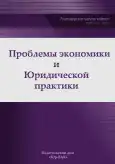Supplementary Reproduction Technologies as a Demographic and Social Development Tool for Russia
- Authors: Prichina O.S.1, Orekhov V.D.2, Moroga D.F.3
-
Affiliations:
- University «Synergy»
- International Institute of Management LINK
- Peoples' Friendship University of Russia (PFUR)
- Issue: Vol 19, No 1 (2023)
- Pages: 268-273
- Section: Regional and Sectoral Economics
- URL: https://journal-vniispk.ru/2541-8025/article/view/250150
- ID: 250150
Cite item
Abstract
The aim of the work is to undertake an economic analysis of practicability of supplementary reproduction technologies regarding human reproduction in Russia and, as a result, improving its long-term competitiveness. The authors consider the impact of reproduction technologies from a narrow economic perspective and intentionally do not involve speculating philosophical, legal, ethical, psychological and spiritual and moral aspects of their implementation. The study undertaken proves material incentives and supplementary reproduction technologies including surrogacy are the most relevant among efficient interventions aimed to improve the birth rate. The authors show surrogacy may become a real way to resolve the reproduction crisis in future. Investments in surrogacy are paid off from 3 to10 years by labour of the adult person starting from their entry into work and about 25 years longer starting from the moment of the investing at the discount rate of r = 4−8%. By the end of conventional labour period, the return on total investment in a person outweighs the investment by 7.2 over 25 years from the moment of investing at r = 4% and amount of investment ZHC = 25% of GDP per capita at PPP. The sources of investments in demographic development of Russia, additionally to the state budget, may reasonably include regional budgets especially of regions of high per capita GDP and low birth rate as well as charitable donations from most wealthy citizens. The results of the work are applicable to strategic planning of forms, methods and mechanisms of government regulation including demographic development of various countries and primarily Russia.
Full Text
##article.viewOnOriginalSite##About the authors
Olga S. Prichina
University «Synergy»
Author for correspondence.
Email: olgaprichina@mail.ru
ORCID iD: 0000-0002-3069-3755
Dr. Sci. (Econ.), Professor, Professor of the Department of Economic Theory and World Economy
Russian Federation, MoscowViktor D. Orekhov
International Institute of Management LINK
Email: vorehov@yandex.ru
ORCID iD: 0000-0002-5970-207X
Cand. Sci. (Eng.), Director of the Scientific and Educational Center
Russian Federation, ZhukovskyDenuts F. Moroga
Peoples' Friendship University of Russia (PFUR)
Email: denuts@moroga.ru
ORCID iD: 0000-0003-0076-2200
postgraduate student, Medical Institute
Russian Federation, MoscowReferences
- Orekhov V.D., Karanashev A.H., Schennikova E.S. Forecasting the growth rates of Russia in comparison with the dynamics of the largest economies until the end of the XXI century. Moscow Economic Journal. No.8, 2021. —pp. 494–520. doi: 10.24411/2413-046X-2021-10469.
- Kalabikhina I. E. About regional maternal (family) capital. Vestn. Moscow. un-ta, ser. 6. Economy. 2013. No. 2, pp. 62–70.
- Reason O.S., Orekhov V.D., Reason D.Yu. Transformation of human capital of the regions of Russia. M., Problems of Economics and Legal Practice of the Legal Academy, issue No. 6, 2022.
- Polonsky I. Demographic gap in Russia: how to avoid population extinction? Military review. —2019.
- Friedman J. The next 100 years: Forecast of events of the XXI century. Eksmo. —2010.
- Cohen A., R. Dehejia, D. Romanov (2013). Financial incentives and fertility // Rev. Econ. Stat. 950 (1): 1–20.
- Milligan K. (2005). Subsidizing the stork: new evidence on tax incentives and fertility // Rev. Econ. Stat. 870 (3): 539–555. URL: https://papers.ssrn.com/sol3/papers.cfm?abstract_id=305071.
- Sorvachev I., Yakovlev E. Could a child subsidy increase long-run fertility and stability of families? Could it have equilibrium effects? Evidence from the “Maternity Capital” program in Russia. —2020.
- Emily A. Partridge, Marcus G. Davey, Matthew A. Hornick, Alan W. Flake et al. An extra-uterine system to physiologically supportthe extreme premature lamb. Nature Communications 8, Article number: 15112 (2017).
- Akhmatyanova V.A. Surrogacy in Russia: analysis of legislation and practice. The rule of law: theory and practice. No. 4 (46) 2016.
- Litvintseva G. Russia—among the world leaders in surrogacy. Eurasianet. Wikipedia. 2018.
- Rusanova N.E. Surrogate motherhood in modern demography. Population No. 1, 2009.
- Gridina V.V. Surrogate motherhood: a solution to the demographic problem or a threat to society? Published. Rusains. Medicine. Sociology. Philosophy. Applied research. —No. 1, 2019.—pp. 62–69.
- Lewin, K. (1951) Field Theory in Social Science, Harper & Row.
Supplementary files











